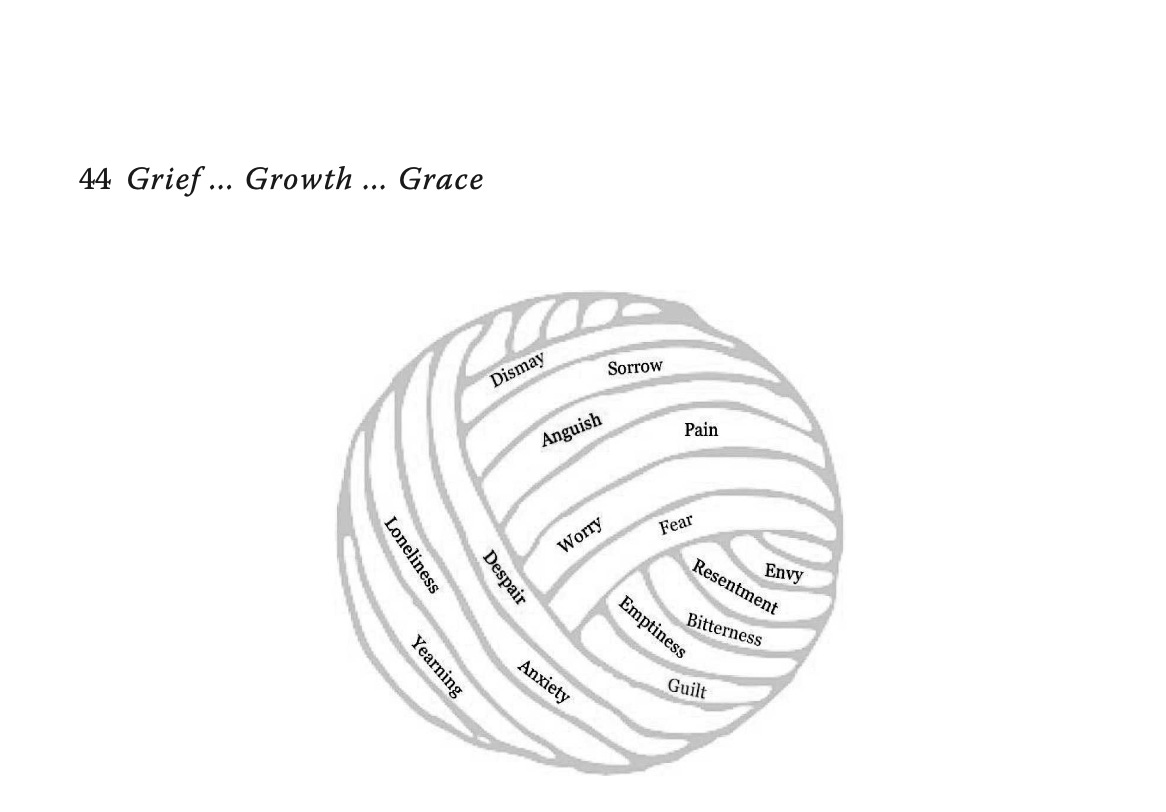#13 A language for grief
Creating a grief vocabulary that honours your experience
“Give sorrow words;
the grief that does not speak
knits up the over wrought heart
and bids it break.”
~ William Shakespeare
Connection and relationship are at the core of coming alive as a human. And language, along-with other ways of communication, plays a central role in fostering human connection. The science of social constructionism and appreciative inquiry hold that “words create worlds”. True indeed. Words fill meaning in human connection. Language enriches us. Unfortunately sometimes language also fails us, painfully so.
There is nothing more despairing than fumbling for right words to express human feelings. Such bereft-ness of language never hurts more than when you are in grief. As someone practicing, training and writing in the realm of ‘Grief & Growth’, and a bereaved mother myself, time and again I have witnessed in others and experienced myself, a sense of blankness to convey the precise feelings and emotions of grief journey.
The pain of loss. The pain of shock. The pain of trauma. The pain of yearning. The pain of fear. The pain of worry. The pain of survivor or recovery guilt. The pain of feeling destitute. The pain of social isolation or abandonment. The pain of despair. The pain of anger. And more. How do you expect a griever to tell you in public vocabulary what precisely her/his pain of grief is like in a given moment? It is no different with other feelings in the entangled ball of emotions that grief brings along.

Grief mutes you. It mutes your language too. No matter how rich your linguistic or communicative gifts have been, you lose your way with words or expression. You desperately search for a new language to communicate what you feel, how you feel. But the public language that we and others know and understand has a painful void when it comes to capturing our grief in words. Sometimes there are no words at all.
“There are words like ‘orphan’, ‘widow’ and ‘widower’ in all languages.
But there is no word in any language to describe a parent who loses a child.
How does one describe the pain of ‘ultimate bereavement’!”
~ Neena Verma, A Mother’s Cry .. A Mother’s Celebration, Page 50
The word ‘bereavement’ comes from the old English word ‘bereafian’ or the Middle English ‘bereven’ which as per Merriam Webster Dictionary mean ‘to rob’, ‘deprive of’, ‘take away’ or ‘tear away’. In a symbolic way, loss by death actually feels as if one has been torn apart, robbed and deprived. Every loss hits the bereaved ruthlessly. But what would you call a bereaved parent? What would they call themselves? There are words like ‘orphan’, ‘widow’ and ‘widower’ in all languages. But there is no word in any language to describe a parent who loses a child. Karla Holloway, an English Professor at Duke University, and a bereaved mother herself, felt “punished by this empty space of language”, and chose to use the Sanskrit word ‘vilomah’ to give a name to the tragic identity of her bereaved-motherhood. In literal terms, ‘violmah’ does not in any way relate to the death of a child. It actually means ‘opposite’ or ‘in the other direction’. But Prof Holloway used it to convey the sense of her loss being “against the natural order”.
The death of a child is indeed in every sense against the natural order of life. For a parent chosen to carry the cross of this loss, each moment is heavy and barren in a way that can neither be described, nor understood. When children go, they leave behind shattered dreams, which not just pierce the whole-being of the bereaved parents, but also silence their expression forever. I see almost all the bereaved parents that I interact or work with, wear a crippling dense silence when it comes to giving words to their pain. I know this pain first-hand. I too felt barren expressing my feelings. How could I ever say in words the unimaginable pain of holding my son lifeless in my arms, of having to put on pyre the mortal remains of someone I had nurtured in my womb, given birth to, held lovingly in my lap and heart. I received mails/calls/messages from bereaved parents all over the world who felt a cathartic experience reading my grief memoir A Mother’s Cry .. A Mother’s Celebration. Their pain finally got a voice and expression.
The experience of such barrenness of language is not much different for other grievers. Living with grief is like living in wilderness. No known path. Not even a trail. No familiar sounds. Not even of those we have known for long. None except your own deadening echo. And beyond a point that too fades away. No way to bare our broken heart and convey our woundedness. How does one say what one feels like when on a grief journey?
Reality, dear reader, is that public language would never be adequate (leave alone eloquent) enough to absorb and express the unique complexity, depth and expanse of grief. Reality also is that as much as we hate to be there, none of us can wish away or escape the inevitability of loss and grief. So how does one find a way in this wilderness. Well, we find one by walking one, in faith.
“There is no path, not even a trail.
They walk in faith, and make a path.”
~ Neena Verma, Grief ~ Growth ~ Grace – A Sacred Pilgrimage, Page 74
Create your own language for grief
For long, people thought I was in denial whenever they heard me talk of my son as “my transcended son”. Some people still find it odd. And many people don’t even understand. It is OK. I saw and acknowledged the questions and judgments in their words and demeanour. I chose nonetheless to honour my own deeply alive and personal experience. Notice the word ‘and’. Give it a special place in your personal language. Even more, consider replacing ‘but’ with ‘and’. I acknowledged both the above divergent realities as simultaneous truths, rather than letting them any one of them prevail over the other. For me, my son has transcended the mortal world. He continues to live in my heart and consciousness. His ‘Presence’ is alive. Shall always be. He is “my transcended son”, not “my late son”.
Let me share another scenario. It is painfully hard for a bereaved parent to face the question “how many children do you have?” I know too many bereaved parents who bury their silent wail beneath a masked faint smile, and somehow mutter under their breath the original or the loss-altered number, whatever their wisdom in the moment guides. For me the answer is always an emphatic “two”. Mother Nature blessed me with two children. And that is an abiding truth. It is the next question though – “what do they do?” – which tries you harder. After a long painful struggle, I have created my own language that gives voice to how I feel. I say “I am a proud mother of two amazing children. Destiny recalled my elder son **** ago. He is spreading his light in the cosmos. My younger son is ****.”
Most people go quiet, perhaps more awkward in their own relationship with the phenomenon of death, bereavement and grief, than in absorbing the unfamiliar feel of my grief language. Some people make secret hush-hush remarks about my mental state. Some begin to advise - mostly sermons, platitudes and cliches which are at best hollow, and at worst insensitive and hurtful. And then there are some who take me in a silent compassionate embrace. Their silent gesture is far more eloquent than words can ever be.
“The weight of this sad time we must obey.
Speak what we feel, not what we ought to say.”
~ William Shakespeare
Shakespeare is wise in his advice. Try creating a grief vocabulary that honours your experience. I hear some bereaved parent say the word “angelversary” to affirm the day of death, still-birth or miscarriage of their beloved child. Whoever created it, I can never thank them enough. Being a bereaved mother and someone who miscarried thrice in between her two children, I find immense solace and strength from this word.
I need a courageous, compassionate and wise heart to hold the much-bereaved vulnerable mother in me warm and strong. I call myself a ‘chosen mother’.
Early on I had started calling my transcended son ‘my anchor’. He continues to keep me anchored and rooted, now from the womb of my heart. Being uniquely rich in his poetic linguistics and evocative expression, he got another name from me – ‘my bard’. He emerged at the dusk of a 24th, a Wednesday, and transcended to the horizons of eternity at the dusk of another 24th, another Wednesday, 22 years and three months later. He is my ‘Bard of the Dusk’. Shall always be.
Nudge yourself to find or create a grief vocabulary that helps you sit with your grief in an affirmative, compassionate and quietly strong way. Honour your grief with your own language of grief.
As a ‘Grief & Growth’ and ‘Resilience, Purpose & Transitions’ Coach, Practitioner & Trainer, I am here to help you in healing your grief, growing from it, and finding/creating your own grief vocabulary that honours your experience. Please feel free to reach me at growwithneena@gmail.com if you need counselling, coaching, therapy, expert companioning, training or mentoring in the ‘Grief & Growth’ and ‘Resilience, Life-Purpose, Post-traumatic Growth, Transitions & Ageing’ realms.
Stay tuned to continue learning more about the complex phenomenon of grief, and my six-phase GROWTH Mandala model, and to develop #GriefWisdom. Meanwhile, you may find some solace, support and strength in my books Grief ~ Growth ~ Grace – A Sacred Pilgrimage and A Mother’s Cry .. A Mother’s Celebration. Read yourself and/or gift to someone on a grief journey, or grief practitioners. And if you like my books, please leave your review on Amazon & Goodreads
Above all, remember to hope, love & smile.
If what you read resonates with you, please mark a LIKE,
leave a COMMENT to let me know your thoughts and feelings, and
SHARE with others, especially with those on a grief journey &/or grief practitioners.
And if this essay came as a forward to you, and you like it, please like, comment, SUBSCRIBE and share.



Very beautiful and heartfelt. Thank you for this article.
Omg, such a touching piece of writing. The language of grief is so important - I realise it now after reading this article. This is a new concept to me.
I still mourn the death of my father I lost 16 years ago, and it feels as if it was only yesterday. I haven’t been able to find words to talk about how much I miss him ever since, but it has surely eaten into me over the years.
Thanks for writing this article. Such a beautiful piece…